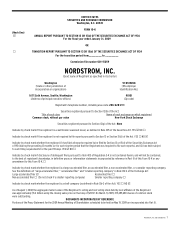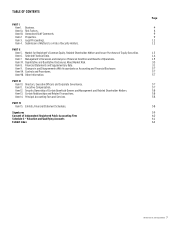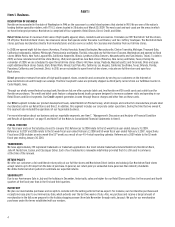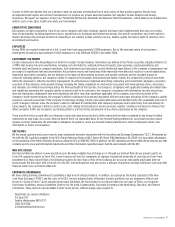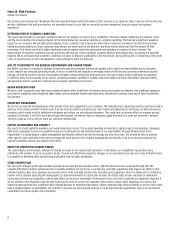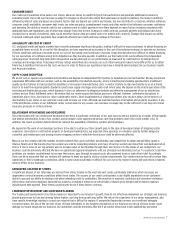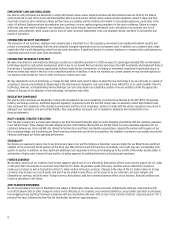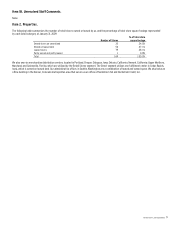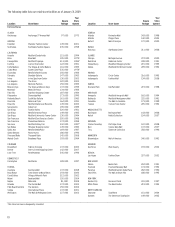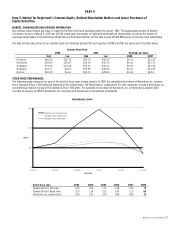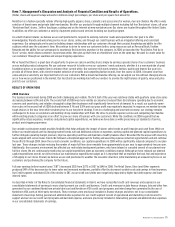Nordstrom 2008 Annual Report Download - page 8
Download and view the complete annual report
Please find page 8 of the 2008 Nordstrom annual report below. You can navigate through the pages in the report by either clicking on the pages listed below, or by using the keyword search tool below to find specific information within the annual report.8
EMPLOYMENT LAWS AND REGULATIONS
Our policies and procedures are designed to comply with human resource laws, employment laws and discrimination laws set forth by the federal
government and in each of the states and municipalities where we do business. Human resource laws include regulations related to wage and hour,
meal and rest period, and commissions. Wage and hour laws are complex, and the related enforcement is increasingly aggressive, particularly in the
state of California. Employment and discrimination laws continue to evolve, making ongoing compliance in this area a challenge. Failure to comply
with these laws may result in damage to our reputation, class action lawsuits, legal and settlement costs, disruption of our business, and loss of
customers and employees, which would result in a loss of sales, increased employment costs, low employee morale, and harm to our business and
results of operations.
INFORMATION SECURITY AND PRIVACY
The protection of our customer, employee and company data is important to us. The regulatory environment surrounding information security and
privacy is increasingly demanding, with new and constantly changing requirements across our business units. In addition, our customers have a high
expectation that we will adequately protect their personal information. A significant breach of customer, employee or company data could damage our
reputation and result in lost sales, fines and lawsuits.
INFORMATION TECHNOLOGY STRATEGY
We make investments in information technology to sustain our competitive position. For 2009, we expect to spend approximately $155 on information
technology operations and system development, which is key to our growth. We must monitor and choose the right investments and implement them at
the right pace. Targeting the wrong opportunities, failing to make the best investments, or making an investment commitment significantly above or
below our needs may result in the loss of our competitive position. In addition, if we do not maintain our current systems we may see interruptions to
our business and increase our costs in order to bring our systems up to date.
We may implement too much technology, or change too fast, which could result in failure to adopt the new technology if we are not ready or capable of
accepting it. Excessive technological change impacts the effectiveness of adoption, and could make it more difficult for us to realize benefits from the
technology. However, not implementing new technologies can also compromise our competitive position. If we are unable to strike the appropriate
balance in the pace of our adoption of new technology, our business may suffer.
REGULATORY COMPLIANCE
Our policies and procedures are designed to comply with all applicable laws and regulations, including those imposed by the SEC, NYSE, the banking
industry and foreign countries. Additional legal and regulatory requirements and the fact that foreign laws occasionally conflict with domestic laws,
have increased the complexity of the regulatory environment and the cost of compliance. Failure to comply with the various regulations may result in
damage to our reputation, civil and criminal liability, fines and penalties, increased cost of regulatory compliance and restatements of our
financial statements.
MULTI-CHANNEL STRATEGY EXECUTION
Over the past several years, we have made changes in our Direct business that better align our online shopping environment with the customer experience
in our full-line stores. These changes included: aligning our Direct merchandise offering with our full-line stores to create a seamless experience for our
customers between our stores and Web site, linking the full-line stores and Direct merchandise organizations; reducing the number and frequency of our
Direct catalog mailings; and transitioning our Direct inventory system onto our full-line store platform. Our inability to continue to successfully execute this
strategy could impact our future operating performance.
SEASONALITY
Our business is seasonal in nature. Due to our Anniversary Sale in July and the holidays in December, sales are higher for our Retail Stores and Direct
segment in the second and fourth quarters of the fiscal year than in the first and third quarters. Accordingly, our results may vary considerably from
quarter to quarter. In addition, we have significant additional cash requirements in the period leading up to the months of November and December in
anticipation of higher sales volume in those months, including expenses for additional inventory, advertising and employees.
FOREIGN CURRENCY
We purchase a portion of our inventory from foreign suppliers whose cost to us is affected by fluctuations of their local currency against the U.S. dollar
or who price their merchandise in currencies other than the U.S. dollar. We purchase goods from many countries and are affected by changes in
numerous currencies as well as fluctuations in the U.S. dollar relative to foreign currencies. Changes in the value of the U.S. dollar relative to foreign
currencies may increase our cost of goods sold, and if we are unable to pass these cost increases on to our customers, our gross margins, and
ultimately our earnings, would decrease. Foreign currency fluctuations could have a material adverse effect on our business, financial condition and
results of operations in the future.
ANTI-TAKEOVER PROVISIONS
We are incorporated in the state of Washington and subject to Washington state law. Some provisions of Washington state law could interfere with
or restrict takeover bids or other change-in-control events affecting us. For example, one provision prohibits us, except under specified circumstances,
from engaging in any significant business transaction with any shareholder who owns 10% or more of our common stock (an “acquiring person”) for a
period of five years following the time that the shareholder became an acquiring person.

